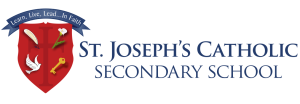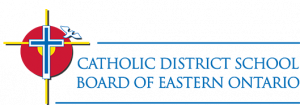Indigenous Education
Ohénton Kariwatékwen and Anishinaabe Kagiizhiitaagoziwin
The Ohénton Kariwatékwen (Thanksgiving Address), is a traditional Haudenosaunee opening that acknowledges and gives thanks to all elements of the natural world. It is a way to express gratitude and remind people of their connection to everything in creation. Similarly, the Anishinaabe Kagiizhiitaagoziwin (Anishinaabe Morning Prayer), gives thanks and reflects on the relationship between humans and the natural world, emphasizing respect, harmony, and gratitude. Both serve as reminders of the importance of maintaining a respectful and balanced relationship with our Mother the Earth.
The CDSBEO is located on both the unceded traditional territories of the Mohawk and Algonquin peoples; while settler land acknowledgments support reconciliation, recognizing the Ohénton Kariwatékwen and Anishinaabe Kagiizhiitaagoziwin holds more respect and importance in this process. These traditional addresses enhance First Nations connections to heritage, culture, and language while fostering a deeper understanding of Indigenous cultures, perspectives, and histories for everyone.
Land Acknowledgement
We acknowledge that the Catholic District School Board of Eastern Ontario gathers on the unceded, traditional Algonquin territory of the Anishinaabe people, as well as the traditional Mohawk territory of the Haudenosaunee people. We respect both the land and the people of this land, including all Indigenous people who have walked and continue to walk in this place.
Meet the Team
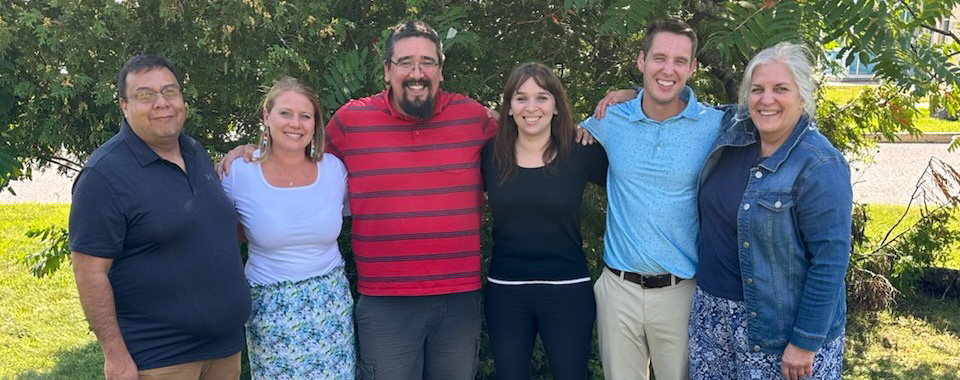
Allen Smoke
Indigenous Student Success Mentor
613-933-1720
Allen.Smoke@cdsbeo.on.ca
Amanda Landry
Elementary Indigenous Education Consultant
343-774-2118
Amanda.Landry@cdsbeo.on.ca
Kaajuk Kablalik
Indigenous Grad Coach
343-774-2093
Kaajuk.Kablalik@cdsbeo.on.ca
Melissa Mader-Tardif
Indigenous Education Lead
613-933-1720 or 1-800-267-7136
Melissa.Mader-tardif@cdsbeo.on.ca
Colby Demerchant
Indigenous Education Secondary Consultant
613-209-9288
Colby.Demerchant@cdsbeo.on.ca
Stéphanie Nelson
Indigenous Grad Coach
343-774-2097
Stephanie.Nelson@cdsbeo.on.ca
Classroom Education
The CDSBEO is continuously working to support Indigenous education for all K-12 students. Below are just some of the learning opportunities happening across the Board:
Learning from Elders, Knowledge Keepers, and Indigenous community partners including;
First Nations, Métis, and Inuit perspectives, Wampum Belt Teachings, Inuit Games, Medicine Wheel Teachings, Basket Making, Beading, Traditional Cooking, Food Systems, Lacrosse, Medicine Pouch Teachings, Métis Nation Building, Storytelling, Inuit Survival Tools, Socials, and more
Supporting Ontario Curricula on;
Residential schools, treaties, the legacy of colonialism, and the rights and responsibilities we all have to each other as treaty people
Registering and exploring Indigenous studies high school courses;
Expressions of First Nations, Métis, and Inuit Cultures (Grade 9), First Nations, Métis, and Inuit in Canada (Grade 10), English: Understanding Contemporary First Nations, Métis, and Inuit Voices (Grade 11), World Views and Aspirations of First Nations, Métis, and Inuit Communities in Canada (Grade 11), Indigenous Ways of Knowing (Grade 11), and Contemporary Indigenous Issues and Perspectives in a Global Context (Grade 12)
Indigenous Education News
-
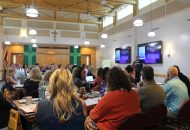
The Haudenosaunee Thanksgiving Address
On September 17th, Allen Smoke, CDSBEO Indigenous Student Success Mentor, taught the Central Leader’s Team about the Haudenosaunee Ohén:ton Karihwatéhkwen (Thanksgiving Address). The Ohén:ton Karihwatéhkwena is a significant expression of…
-
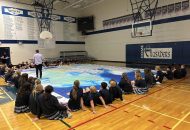
CDSBEO Students Learn Residential School History with Indigenous Peoples Atlas of Canada
In preparation for National Day for Truth and Reconciliation, the CDSBEO Indigenous Education Team has been visiting schools to teach students about the legacy of Residential Schools. Using grade specific…
-
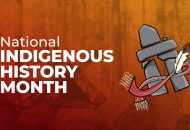
National Indigenous History Month 2024
CDSBEO schools celebrate National Indigenous History Month every June, by spotlighting and sharing the impactful work of Indigenous Community Partners who have and are currently enriching the learning experiences of…
Self-Identification
Indigenous Self-identification is entirely voluntary, confidential, and proof of ancestry is not required. Self-identification provides First Nation, Inuit, and Métis students with access to a variety of educational opportunities to support their learning journey from Kindergarten-Grade 12 with the CDSBEO. Some of these educational opportunities that position them for success include:
- Indigenous Grad Coach Support
- Tutoring where available
- Cultural Teachings
- Field Trips
- Connections to Indigenous agencies
- Referrals to social, emotional, physical, and mental support resources
Please click the following link for more information:
Voluntary Self-IdentificationIf you have any questions, please contact Indigenous Education Grad Coaches Stéphanie Nelson or Kaajuk Kablalik for more information.
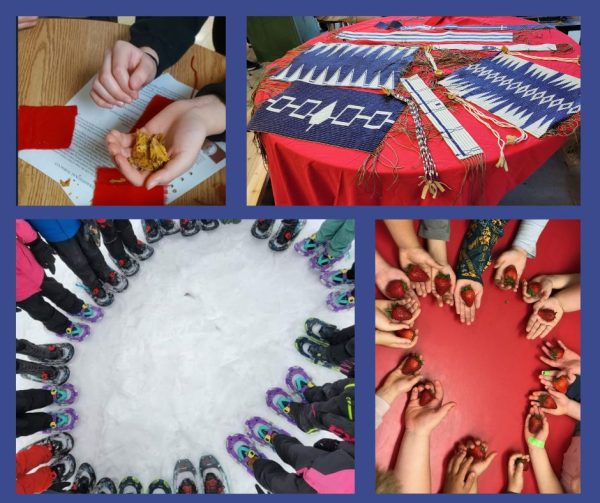
Note: All parents/guardians of Indigenous students, and students aged 18 of age or older, have the right to voluntarily and confidentially self-identify. Through self-identification the Board is able to collect relevant information which helps to provide programs and strategies supporting the needs of First Nation, Métis and Inuit learners. The information is being gathered in accordance with section 29(2) of the Municipal Freedom of Information and Protection of Privacy Act. If you have already completed this form for your child, it is not necessary to re-submit every year.
Reconciliation with First Nations, Métis, and Inuit People
The CDSBEO collaborates with First Nations, Métis, and Inuit people in a process of co-creating new ways of being and knowing together. This includes actively consulting Indigenous peoples, valuing their input in actions and decision-making, and reviewing, and revising policies, practices, and procedures to better reflect Indigenous perspectives, experiences, and needs. We focus on embodying the teachings and reciprocity with Indigenous community partners.
Indigenous Education Councils
The IECs guide school boards and schools in building stronger relationships with communities, sharing information, identifying promising practices and enhancing collaborative work to support First Nation, Métis and Inuit student achievement and well-being.
Elders, Knowledge Keepers, Indigenous community members, educators, administrators, students and parents sit on the CDSBEO IEC. The council meets several times a year to discuss Indigenous Education initiatives happening throughout the CDSBEO.
First Nation, Métis and Inuit Education Policy Framework
The First Nation, Métis and Inuit Education Policy Framework was released in 2007 and outlined our approach to supporting First Nation, Métis and Inuit learners in Ontario. The framework identified two primary challenges to be addressed by 2016:
- to improve achievement among First Nation, Métis, and Inuit students
- to close the achievement gap between Indigenous and non-Indigenous students
For more information on Ministry documents that support our work please visit:
Ontario First Nation, Métis and Inuit Education policy framework (2007) | ontario.ca
Indigenous education in Ontario | ontario.ca

Educational Services Agreement
St. Joseph’s Catholic Secondary School is the CDSBEO Educational Service Agreement High School with the Ahkwesàhsne Mohawk Board of Education. If you are interested in learning more about St. Joseph’s Catholic Secondary School, visit their website at sjcss.cdsbeo.on.ca.
